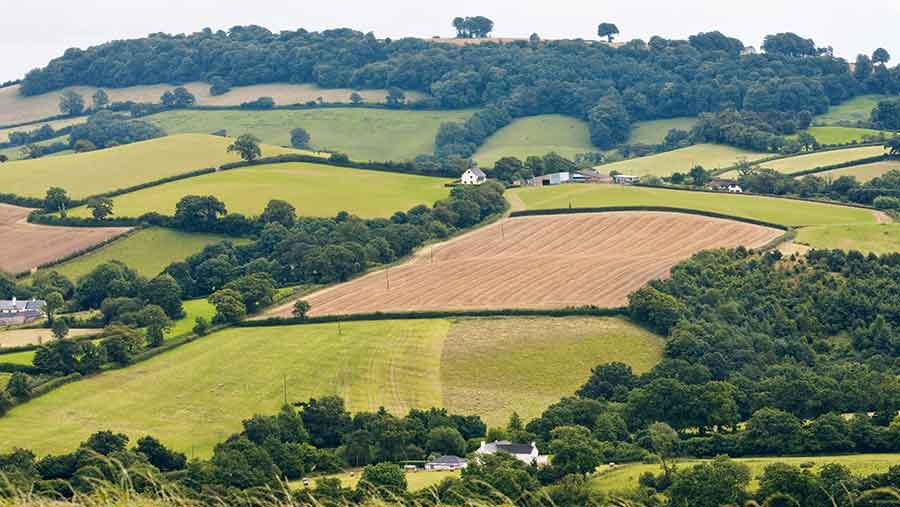Agents fear leaving EU may cause land values and rents to drop
 © Tim Scrivener
© Tim Scrivener A vote to leave the European Union on 23 June could cause years of uncertainty in the UK farmland market.
Farmland demand and values could be hit in the event of a UK exit from the UK, say agents, particularly until the government confirmed whether or not farmers would receive support payments and what levels these would be.
Agents have painted a mixed picture in recent weeks about whether uncertainty ahead of the referendum is affecting the land market already.
See also: Farm leaders demand answers to ‘great unknowns’ of Brexit
But they say they expect the real effect to be felt in the event of a vote to leave in eight weeks’ time.
Lack of support payments could affect values
The CAP is front and centre of most agents’ concerns, according to the Royal Institute of Chartered Surveyors (Rics).
Jeremy Blackburn, head of policy and parliamentary affairs at Rics, said if the UK chose to remain a member of the EU the land market would probably stay stable.
But if the UK voted out, he questioned whether the government would be able to put in place an alternative subsidy structure that didn’t reduce support payments.
“CAP payments and agri-environment schemes account for as much as 70% of farm profitability if you look at statistics from Defra’s latest Farm Business Incomes survey. That’s quite stark for the land sector.
“Rural surveyors and land agents have concerns because of this lack of a direct replacement to the CAP. The government is committed to UK agriculture being less reliant on subsidies and [is also committed to] deficit reduction.
“We would not be confident that CAP money coming back to the UK would be at the same level, so there would be change [in the land market]”
However, Mr Blackburn said 70% of Rics members thought land would continue to be a strong asset class for investment in the long term.
Period of uncertainty ahead if Britain leaves the EU
Knight Frank head of farms and estates Clive Hopkins said he thought the referendum was causing many purchasers to wait before making any decisions.
“The market is saying if we stay in Europe, momentum may return. If the vote is to come out there will be a two-year period of ongoing uncertainty about what will be negotiated.”
Knight Frank’s Farmland Index showed average farmland values fell 3% to below £8,000/acre in the three months to March. Low commodity prices and the possibility of a British exit were cited as possible reasons for the drop.
Will Parker, associate director at H&H Land and Property in Durham, said the supply of land was usually affected during times of uncertainty.
“We have seen over the past two years as the Single Payment Scheme became the Basic Payment Scheme, people were hesitant about selling land. They put it off until everyone had gone through the transition.
“We have not seen a slowing of the market yet, but the concern is that in the event of a vote to leave, another period of doubt would have the same effect.”
Rental values could be affected
Mr Parker said the potential implications for the farm rental market should not be overlooked.
“At the moment a landlord can rent land with entitlements and that is reflected in the rent. In an AHA [Agricultural Holdings Act] tenancy, basic payment information is also taken into account. If basic payment was removed, what would happen to the rent?”
Tim Jones, head of division at Carter Jonas, said a poll of its rural clients had raised similar concerns.
“Many of our clients cited farms rents as an area that would suffer should trade deal negotiations prove lengthy. This in turn could result in a fall in capital values in the short to medium term,” he said.
“Should the UK vote to leave the EU, the CAP subsidies will likely be reduced, which will also have an effect on rents for both AHA and farm business tenancies.”
Scottish farmland feels uncertainty
Uncertainty was also having an effect on the land market in Scotland, said Savills’ associate in Edinburgh, Jamie Wedderspoon.
“The mood among farmers is erring towards caution because of the continued poor commodity prices affecting all sectors and the uncertainty created by the EU referendum.”
“We have seen caution during a period of uncertainty before – historically the land market has paused for breath during times of change, often rallying once the outcome is known.”
“Acres advertised on the open market are up by 50% to the end of March compared with the same period in 2015. This equates to a total of 26 units in comparison to 20 units advertised over the same period last year,” said Mr Wedderspoon.
